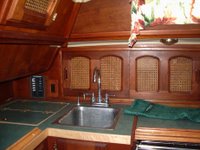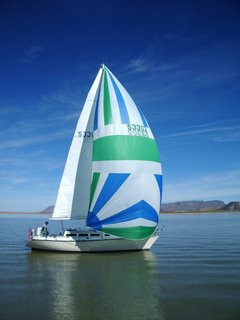Wizards of Winds and Waves, chapter 8
Well, it’s not pretty.
Wizards of Winds and Waves
Chapter 8
When we came out of the tavern, the rain had stopped and the clouds were breaking up. Runyon invited Pierre and me to go sailing with him on his big boat, and we accepted the invitation.
In basic principle, sailing a big boat is not too terribly different from sailing a small boat. You have sails, and you position them on the opposite side of the boat from the direction the wind comes from. You adjust the tightness of the sails according to the direction you’re going relative to the wind – the more directly upwind you’re going, the tighter you need the sails to be. If you can do that, you can sail. Of course, there are all sorts of other adjustments you can make, with things like a traveler or a boom vang, to fine-tune the performance of your boat, but you can learn those as you go along.
All of the same basic principles apply to a big boat as to a small one. The biggest difference is that a big boat will usually need more people on board to make it work. There may be one person at the helm to steer the boat, and another person on the mainsheet to control the tightness of the mainsail, and one or two people to handle the jib sheets to deal with tacking and control the tightness of the foresail, and somebody to work the halyards that are used to raise the sails, and if the boat has a spinnaker, a big, balloon-like foresail, often very colorful, that helps the boat go faster downwind, extra people may be needed for that. And of course, in a stiff wind, it’s good to have a bunch of people sit along the upwind rail to keep the boat sailing more efficiently, by keeping the boat from heeling, or leaning over, too much. A really big racing yacht, known as a maxi, might have 20 or more people on the crew.
On Runyon’s big boat that afternoon, there were just three of us: Runyon at the helm, me on the mainsheet and sometimes jib sheets, and Pierre on halyards, jib sheets and sometimes foredeck. We made a well coordinated team; we’d sailed together on this boat often before, and we had developed a routine that allowed us to sail the boat most efficiently. Any time Runyon ordered a tack, Pierre and I were already ready, and we were prepared for any change of direction he might make, adjusting the sheets to the new point of sail almost before Runyon declared it.
We took the boat down the bay and out the channel into the open ocean. The waves were much bigger here than in the bay, and bigger than usual even for the ocean because the rainstorm that had just passed had raised some surge. But the big, heavy boat plowed steadily through the waves, surging from one to the next with a thudding, crashing splash. We took a course upwind, roughly parallel to the coast, smashing our way along. It was exhilarating; even in a boat this large, there was plenty of ocean spray splashing into the cockpit.
As the afternoon shadows began to lengthen, Runyon brought the boat about for the downwind run back to our own safe harbor. Now that the boat was running with the wind, the ride became much smoother, and Runyon had Pierre raise the spinnaker. With the rainbow-colored balloon sail, we seemed to float along, skimming the waves, and we were back at the channel leading to our bay almost before we knew it. In the golden glow of the setting sun, Pierre doused the spinnaker, and Runyon dropped the mainsail, allowing the boat to coast to a stop.
It was a magic moment. Except for the occasional cry of a gull or splash of a wavelet on the hull, all was silent. The setting sun glowed a brilliant orange among the dispersing clouds. Pierre, his foredeck duties finished, came to sit next to me in the cockpit, and I could feel waves of warmth coming from him, as well as the fragrance of good, old-fashioned sweat combined with Old Spice – yes, Old Spice, I was surprised to notice, not some fancy fifty-dollar-an-ounce eau de cologne worthy of a gigolo. The boat rocked gently on the waves, and the wind, which had abated to become a gentle breeze, brought the aromas of salt, seaweed, and a very slight fishy smell. We took off our sailing gloves, and he took my hand; I felt the warmth as well as the callused palms and chapped knuckles, but I also felt a shockwave that sped up my arm, ricocheted off my collarbone, and lodged in my groin, where it continued to pulse. I shifted on my seat to ease the pressure; he shifted closer to me, making it more intense.
The sunset went through progressing shades of orange, red, russet, purple, indigo, and finally black. I almost didn’t notice. When it was fairly thoroughly dark, Runyon started up the diesel engine and motored back to the marina.
Walking back to my apartment that night, I was once again leaning on Pierre, but this time it wasn’t a show for onlookers, or physical exhaustion on my part. We stopped at the seafood market down the bay to get something to cook for supper, although that late in the day, there wasn’t much to choose from. I picked out a couple dozen fresh oysters, which also happened to be on special.
“Aren’t those the wrong sort of thing for an ingénue to be sharing with a dirty old man?” Pierre asked.
“The bit about them being an aphrodisiac is a myth,” I replied. “I learned that in college, if nothing else. Any effect they have is purely placebo – if you believe they work, that makes your body respond.”
“I guess it’s a good thing for me that the women I’ve dated have bought into the myth – it works for me!”
“Besides, I like them, and it doesn’t hurt to have something nice once in a while.”
When we got to the apartment, I took the oysters into the kitchen. “You can work on cleaning that sofa, while I fix these up.”
Pierre set about spraying the sofa with shampoo and scrubbing the suds into the upholstery, while I set about preparing oysters Rockefeller, a treat I have seldom been able to enjoy, but which I wasn’t going to miss out on now. Wearing protective gloves, I used a short, fat knife to pry each oyster open and pry the oyster flesh from the shells, leaving each gray blob of flesh sitting on top of one of the shell halves. I spread a layer of rock salt onto a cookie sheet, and nestled each oyster-on-half-shell in the coarse salt. On top of each, I put some crushed garlic, some fresh parsley, some bread crumbs, and some fresh-grated Parmesan cheese. Then the oysters went into the oven for a brief toasting, while I whipped up a quick Hollandaise sauce. In minutes, the oysters came out of the oven, transformed from gelatinous blobs into tender, tasty treats, ready for a dollop of Hollandaise. While we waited for the upholstery shampoo on the sofa to dry, Pierre and I feasted.
“Now I’m wondering,” Pierre said. “Are you sure that oysters don’t do what they’re supposed to do? Maybe we don’t need to bother cleaning up the sofa. Maybe I’m not going to need it.”
“Hey, I’m innocent, remember? You’re supposed to put the ladies’ man thing on hold while you’re my guardian angel.”
“So then why did you get oysters, of all things?”
“To test your worthiness and morality?”
“Oh, shut up,” Pierre said, slapping an oyster into my mouth. I retaliated by popping one into his. He swallowed that one, then put another into his mouth, then suddenly leaned forward, pulled my face up to his, put his mouth over mine, and squirted the oyster into my mouth. In reflex action, I swallowed. The oyster went down my throat, and the shockwave that went with it continued downward to join the earlier shockwave making earthquakes in my pelvic region. His tongue, meanwhile, was doing some sort of tango with mine. His arm wrapped around my waist, pulling me up from my seat as he rose from his, until our bodies were pressed tightly together. We were so close to equal in height, neither of us needed to bend over. Pierre’s scent of sweat and Old Spice swept over me, and the heat from his body was coming across in pulsing waves, in unison with my heartbeat, which was pounding both loud and fast. His tongue began wandering over my chin, down to my throat, and then around and up, where he began nibbling on my ear, breathing gently into it, while his hands began moving down my sides. Suddenly, a sharp shock hit me like an icy knife in my lower gut.
I pulled away, gasping for air. “No! … This isn’t … right. …” I felt a feeling like a frigid claw in my chest gripping my heart, and the earthquakes lower down had been replaced by a feeling of a cataract of ice water splashing through my lower abdomen. “Something’s wrong.”
“What is it?” Pierre asked, tentatively extending a finger to dab a tear from my cheek.
“I don’t know.”
“Can I do anything to help?”
“I just need … I need … I need to be alone for a little while.”
“I’ll go and see if the suds on the sofa are dry enough to vacuum up. You go and get some rest.”
I got into my nightshirt and crawled into bed, barely aware of the hum of the vacuum cleaner as Pierre glumly prepared what was probably going to be his permanent bunk, at least at my place.





